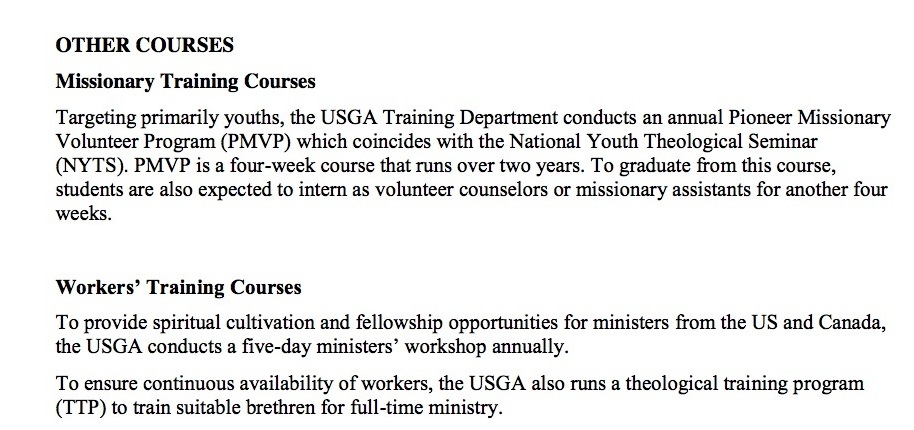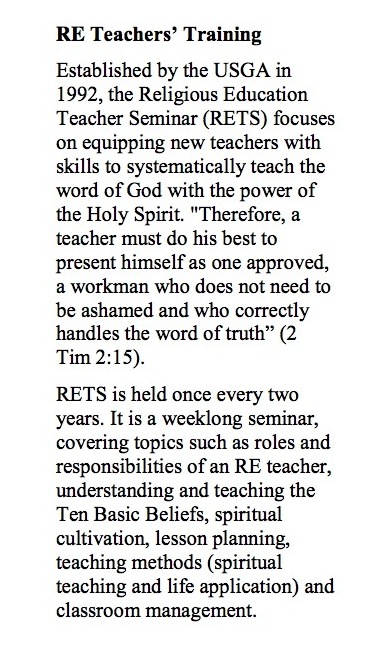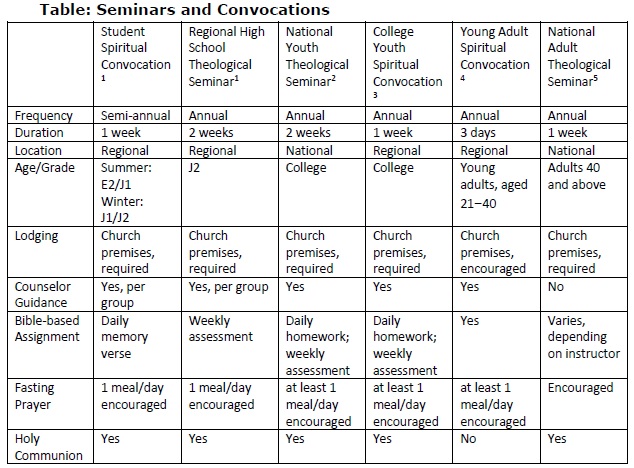United States General Assembly Now so it was that after three days they found Him in the temple, sitting in the midst of the teachers, both listening to them and asking them questions. (Lk 2:46) At the early age of twelve, Jesus already knew the importance of learning and understanding more about God. Opportunities to draw near to God come not only when we are mature, but can start when we are young, and eager to learn and increase our knowledge. This is why the True Jesus Church has established a structured religious education (RE) system based on a comprehensive Bible-based curriculum. The objectives of religious education are to: - Impart spiritual knowledge to the students and build up the pure faith within them (2 Tim 3:15; Col 3:16).
- Guide students toward Christ-like behavior and teach them to live a Christian way of life (Prov 22:6; Mt 5:14–16).
- Guide students to pray for the power of the Holy Spirit and to serve in the kingdom of God (Gal 5:22–23; Acts 1:8).
- Train students to preach and be effective witnesses with the power of the Holy Spirit and the word of God (2 Tim 4:2; Mk 16:15–18; Mt 24:14).
RELIGIOUS EDUCATION SYSTEM In the United States (US), the RE system comprises weekly classes, as well as convocations and theological seminars, for students aged from four to twenty-two, to help them build a lifelong faith. Weekly RE classes are divided into these age groups: - Kindergarten (4–5 years old)
- Elementary 1 (6–8 years old)
- Elementary 2 (9–11 years old)
- Junior 1 (12–14 years old)
- Junior 2 (15–17 years old)
- Senior (18–22 years old)
SEMINARS AND CONVOCATIONS In addition, the US General Assembly (USGA) organizes spiritual convocations and theological seminars throughout the year to support the religious education of both young and old alike. These range from student spiritual convocations for participants aged nine and above, to national adult theological seminars for our members aged forty-plus. These courses bring home the importance of pursuing a lifelong learning of the word of God and fulfill the four religious education objectives. Each event is based around a specific theme, and includes Scripture-based classes, life application teachings, and testimony sessions. When taken in tandem with weekly RE classes at the local church level, these seminars and convocations provide a comprehensive Bible-based education that equips the participants with the word of God on their lifelong journey of faith. SHARING Below, a college student shares how attending religious education events has impacted her life: The summer before I started fourth grade, I took the first step of my spiritual journey when I attended Student Spiritual Convocation (SSC). The first thing that came to my mind about a one-week church camp was having to pray constantly and read the Bible every day, things that I, like most children, did not enjoy. I did not want to leave home for a week to go to an unfamiliar place. But, through the encouragement of my parents and church teachers, I ended up going. I had mixed feelings of anxiety, frustration, and fear as my parents left me at the church in Garden Grove for my first SSC. However, I quickly found that my counselors were very welcoming, and there were many other kids my age who were feeling the same way as I was. I gradually adapted to the environment around me and made new friends who have since become my close spiritual companions. That SSC was special because I received the precious Holy Spirit, whom I longed for after seeing others around me receiving the Holy Spirit. By the end, I did not want to leave because I felt that the church had become my home—a warm and familiar place. In the years following that SSC, I began to look forward to each upcoming event. Each time, I learned something new about the Bible through the various topics and teachings given. Because events such as Winter Student Spiritual Convocation and Regional High School Theological Seminar were directed specifically towards a certain age group, they were especially edifying and relatable. Moreover, I received a vast number of spiritual lessons that still remain with me now. After attending my first National Youth Theological Seminar this past summer, I realized that I have come a long way on my spiritual journey and that God is truly abiding with me through these events. This is now my own faith and not my father or mother’s faith. These events help me to revive my spiritual life, which may have faltered after a long year in school, and remind me of God’s love and His continual guidance in my everyday routines. Being able to meet my spiritual buddies in person instead of virtually also enforces the act of praying together and interceding for one another. Attending these seminars and convocations every year allows me not only to gain more biblical knowledge but also to spiritually mature and grow in God’s teachings. There are never too many events to attend and it is always such an amazing opportunity to be able to build up servitude in Christ and to experience His love. CONCLUSION Religious education has always been the responsibility of God’s chosen people. Moses said to the Israelites: “Now this is the commandment, and these are the statutes and judgments which the LORD your God has commanded to teach you, that you may observe them in the land which you are crossing over to possess, that you may fear the LORD your God, to keep all His statutes and His commandments which I command you, you and your son and your grandson, all the days of your life, and that your days may be prolonged. Therefore hear, O Israel, and be careful to observe it, that it may be well with you, and that you may multiply greatly as the LORD God of your fathers has promised you—‘a land flowing with milk and honey.’” “Hear, O Israel: The LORD our God, the LORD is one! You shall love the LORD your God with all your heart, with all your soul, and with all your strength.” “And these words which I command you today shall be in your heart. You shall teach them diligently to your children, and shall talk of them when you sit in your house, when you walk by the way, when you lie down, and when you rise up. You shall bind them as a sign on your hand, and they shall be as frontlets between your eyes. You shall write them on the doorposts of your house and on your gates.” (Deut 6:1–9) The command is clear: God's chosen people must keep His word before their children. When we understand the tremendous potential God sees in our children, we will care for them as precious treasures, whose value only increases with each generation. Though religious education spans a lifetime, it is our calling to support one another, as well as the church, in working towards the goal of building up the faith of our children in the Lord.
1Participants are separated into same-gender groups, each with at least one counselor to provide guidance and spiritual support throughout the week. The counselors encourage students with the word of God to pray and to draw near to God, and lead morning Bible studies, daily discussions, and nighttime sharing within each group. Participants also have the opportunity to fellowship with members from other churches and learn about God through curriculum specifically created for their age group. 2The curriculum is aimed at providing a deeper understanding of the Scriptures and life application teachings for college students. Participants are separated into groups for sharing and Bible study, and a team of counselors oversees all groups and marks homework. Participants must attend four years of NYTS full-time and give a twenty-minute sermon in order to graduate. 3The curriculum is aimed at providing a deeper understanding of the Scriptures and life application teachings for college students. Participants are separated into groups for sharing and Bible study. 4Participants are separated into groups for discussion. 5Under the purview of the Training Department, which falls under Religious Education, even though participants no longer attend weekly RE classes.



| 

